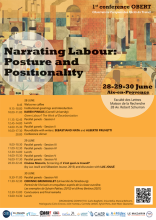CfP ELHN Working Group Labour and Family Economy: Labour and Old Age / Labouring Elderly
Call for Papers
EUROPEAN LABOUR HISTORY NETWORK
WORKING GROUP Labour and Family Economy
Uppsala (Sweden, 11-13 June 2024)
Organizers: Maria Papathanassiou (Department of History and Archaeology/ National and Kapodistrian University of Athens) - Beatrice Zucca-Micheletto (DiSSGeA, University of Padua)
Labour and Old Age / Labouring Elderly

